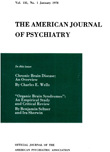CHRONIC PSYCHOSIS FOLLOWING EPILEPSY
Abstract
From a study of the literature and of the cases suffering from epilepsy which later developed chronic psychoses with delusions, no evidence was found to support either of the hypotheses implicit in earlier writings: that schizophrenia occurs more, or less, frequently in epileptics than in the general population; but there was a suggestion that affective psychoses occur less frequently, that depressive psychoses are very rare and that hypomanic psychoses may take a typical form of a divine revelation followed by elation and Messianic delusions. This last category is the only evidence to suggest a typical chronic epileptic psychosis.
No case suffering from a paranoid reaction of sufficient severity to satisfy my original criteria, that could not be classified as affective or schizophrenic, was found.
The high incidence of clinical and/or EEG evidence implicating the temporal lobe, supports the view that psychosis following epilepsy is related to temporal lobe dysfunction.
It is suggested that epilepsy in subjects liable to schizophrenia tends to manifest itself in the temporal lobe.
Access content
To read the fulltext, please use one of the options below to sign in or purchase access.- Personal login
- Institutional Login
- Sign in via OpenAthens
- Register for access
-
Please login/register if you wish to pair your device and check access availability.
Not a subscriber?
PsychiatryOnline subscription options offer access to the DSM-5 library, books, journals, CME, and patient resources. This all-in-one virtual library provides psychiatrists and mental health professionals with key resources for diagnosis, treatment, research, and professional development.
Need more help? PsychiatryOnline Customer Service may be reached by emailing [email protected] or by calling 800-368-5777 (in the U.S.) or 703-907-7322 (outside the U.S.).



